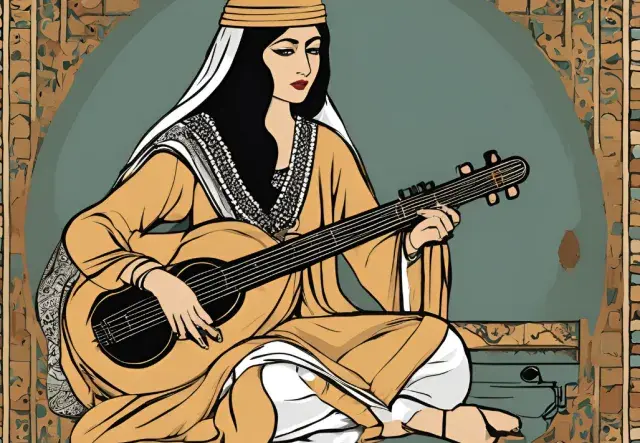"Al-Adda" and "Al-Dakukat"... The Hidden Heritage of Women's Folk Music in Basra

Basra's women's music bands are an integral part of its rich and diverse cultural heritage. These bands represent a living expression of the city's musical identity and its long social history. Throughout history, women in Basra have passed on musical heritage from one generation to the next, preserving the spirit of authenticity and popular traditions. Despite the challenges these bands have faced over the decades, they have continued to play their vital role in society, sometimes covertly and sometimes with the modesty of the musical material presented. In doing so, they affirm the place of women's music in shaping Basra's popular cultural identity.
Al-Adda is a name given to female musical groups, and it means a band, and a woman is responsible for the adda, her task is to organize and coordinate in general and she is often the main singer, and this name was common in previous decades, especially in the city of Zubair where these groups spread, where they were famous for female musical groups whose members were all women and they used to enliven weddings in the homes of the notables, especially women's weddings and gatherings, as these female groups are considered authentic Basra folklore, and female groups or adda are a form of musical culture in the city of Basra, and these groups were also called (Dakukat) and these groups used to enliven wedding parties for women and specifically the rituals of (Al-Jalwa), and Al-Jalwa is a ritual known in the city of Zubair and Basra in general, and it is a spiritual ritual held for the bride on her wedding night to celebrate her and pray for the bride and groom to succeed and have a happy life, which is that four women hold a white cloth and place it over the bride and repeat some verses in the rhythm of the Samri such as (Amina In its safety and sweetness in its meanings) in addition to some praises of the Prophet and mention of the blessed marriage of the Prophet’s family.
These bands were distinguished by their performance of traditional Iraqi folk songs, and the female singers usually opened the songs with a Mawwal. These bands did not compose their own songs, but rather relied on popular Iraqi and Arab songs. These bands consist of a group of female tabla players, a kasour player, and one female singer, in addition to the fact that the female percussionists chant in the form of a chorus to add enthusiasm among the celebrants.
The presence of women's bands in the city is considered an indication of taste and temperament in the love of singing and companionship, and of course women used this profession as a job that brings livelihood and fame. Among the most famous Basra bands are (Zakia Al-Dakouka Band, Umm Ali Band, and Umm Ghosoun Band), which were known for their distinction in Basra and the Gulf and sang ethnic heritage songs in a distinctive and wonderful way. It is also worth noting that women participated in the sessions and songs of the Khashab, at the level of singing, and at the level of clapping or chorus as part of the principles of singing this art. There were also women's bands that performed the Khashab art, such as (Hajjah Sheikha Awda Al-Mahna Band - Umm Zayed Band - Umm Maryan Band - Umm Hussein Band - Umm Hadeel Band - Umm Amina Band). However, it is important to mention that there were sessions held jointly between women and men in the last century, unlike the Iraqi Maqam in Baghdad, where women's participation was present, "and this comes from the premise that the Maqam is masculinity, strength, and loftiness."
These sessions quickly disappeared after 2003 until now, and the Khashab sessions remained limited to men only. It is important to mention that these women “were mostly of African origin (black African Iraqis) who multiplied in the city of Zubair, and historically they came to this city through persecution and slave trade. These arts are part of their way of life and religious rituals that they practiced in a place called Al-Makid. Al-Makid was a place for practicing the rituals of black African Iraqis in the past, and these rituals were often completely linked to rhythm. Later, with the passage and development of time, they mixed them with the arts present in the city of Basra. These women’s groups were previously called Al-Adda, as we mentioned.” It can be said that this responsibility carried out by the person in charge of Al-Adda is a simplified model of musical leadership.
As for the current situation, women's bands have become few in number, as they perform at wedding parties, but they are limited to women only and do not include mixed parties, which has been reflected in the musical material presented and made it simple and modest. There is no doubt that this noticeable decline in the number of women's bands is due to the security, social and political circumstances, as the number of these bands today does not exceed the number of fingers on one hand.
Author: Hussein Ali Al-Mansouri (Iraqi Al-Firdaws Association)
This content is licensed under a Creative Commons CC BY-NC 4.0 license.




